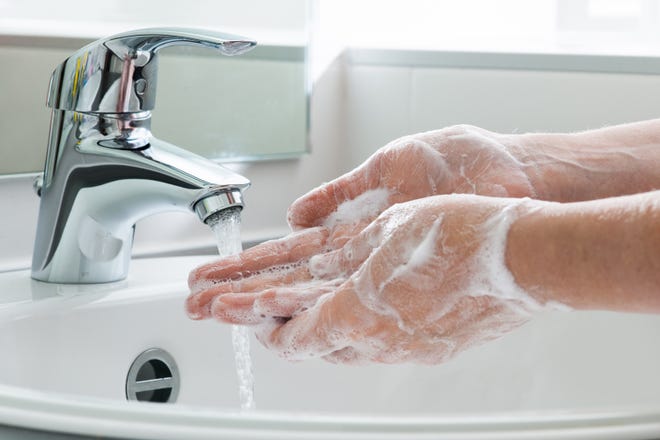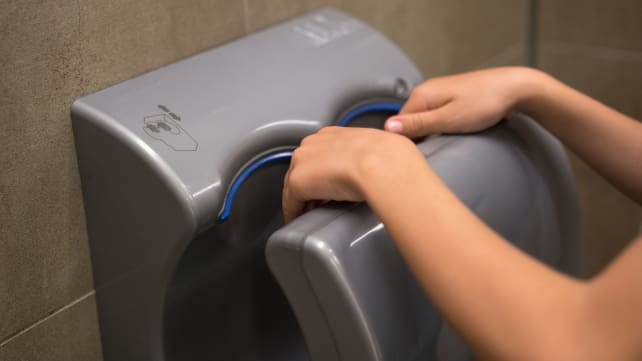Does all the automation in bathrooms help or hurt?
By itself, the toilet flushes.
By itself, the faucet starts.
By itself, the hand-dryer blows, the soap-holder squirts, and the towel dispenser dispenses.
Automated public restrooms, an increasingly common feature in America since their introduction in the 1980s, can seem like magic.
But is their magic powerful enough to defeat coronavirus?
That’s the kind of question we’re likely to be asking, now that COVID-19 is starting to make us all nervous.
For instance: as has been widely reported, the Centers for Disease Control and Prevention (CDC) recommends that we wash our hands “vigorously” with soap and water for at least 20 seconds.
We timed one of our own automatic, no-touch faucets, from first drip to last: 11 seconds.

Hot-air dryers, especially the touchless variety, may tout their “hygienic” properties — but there are studies that suggest they can spread germs.
And however vigorously we wash, however hands-off our bathroom experience, does it really matter if we touch the doorknob on the way out?
“I think the water running without touching the faucets, the toilet flushing, those are great places to start to prevent infections,” said Dania Huie-Pasigan, college nurse at Bergen Community College in Paramus.
Don’t touch
Some 1,000 students are enrolled in 10 degree programs at BCC, ranging from nursing to surgical technology, in their division of health professions. But one thing they’re all talking about, now, is COVID-19.
“We teach our students the universal precautions, so they are protecting themselves, their own families, and their patients,” said Susan Barnard, dean of the division.
So how about that 11-second faucet?
Not necessarily a bad thing, said Dennis Kruk, director of the center for simulation at BCC, and a veteran paramedic. In fact, it might even be a good thing.
“When you’re washing your hands, you don’t necessarily need the water running the entire time,” Kruk said. “It turns off, to give you the opportunity to properly wash your hands, to get the soap between your fingers, under your nails, into the nooks and crannies. If the water was running, it would be washing the soap away.”
There are, of course, other reasons the sink might be programmed to shut off sooner rather than later.
It conserves water. And it saves money.
Those are reasons that the automatic bathroom has been the holy grail of the plumbing community, from the day the first handyman turned the first socket wrench.
There’s a fascinating exhibit at The Plumbing Museum — yes, there is such a thing — in Watertown, Massachusetts. Dating from 1914, it’s an automatic-flushing toilet, made by the J.A. Vogel company in Wilmington Delaware.
“When you get up, the seat goes up and causes the flush,” said Sasha Parfenova, the museum’s program manager. “They were popular in railway stations, for sanitary reasons.”
But it wasn’t until the 1980s that today’s science-fiction Smart Bathroom became a reality.
The future is here
Feb. 7, 1984, to be exact — when the sensor-activated faucet was patented by an Australian inventor, Oliver N. Wareham. Among the patent claims: it would “prevent bacteria transfer in areas such as hospital use or food preparation” and help prevent “flooding and waste of water.”
Now, three or four generations later, the technology has become even more Jetsons-like.
The bathrooms at Atlanta’s MARTA public transit stations have “virtual restroom attendants” (after 9 minutes, a recorded voice tells you to hurry up), sensors that mete out toilet paper a few squares at a time, and an auto cleaning function that can hose down the whole place.
“In countries like Japan, they even have automatic bidets, things like that,” Parfenova said.
All of this far-out technology may be about to get its trial by fire, now that coronavirus has arrived. It may be the robo-faucet’s shining hour.
“I think it’s great that there are these self-flushing toilets and sinks where you don’t have to touch the handles.” Parfenova said. “It’s good for health.”
What’s key to remember, says Kruk, is that none of this newfangled technology matters, if you don’t do the old-fashioned thing and wash your hands — thoroughly. “I think the greatest thing we can do is proper hand-washing,” Kruk said.
Hot air

That’s the real issue with the blow-dryers, which also have their good points (for one thing, the trees will thank you). But a 2014 study by the University of Leeds found that the airborne germ count around air jet dryers was 27 times higher than around towel dispensers, according to the University’s “Health News” website.
It’s not that blow driers themselves are more unsanitary, Kruk said. It’s that the force of warm air spreads the germs from badly-washed hands.
“The pressure of the wind, the force that’s generated, will potentially spread in a greater circumference around the dryer than a paper towel would, because of the increase in air pressure,” he said.
“But the flip side of that is, if we’re doing proper hand-washing techniques, the contaminants that would be spread would be limited.”
Air-blown or towel-dried, your wonderful, squeaky-clean 20-second-washed hands will do you no good — if you then have to touch a doorknob or handle touched by a dozen other germy people on the way out.
That’s why some public restrooms — for instance, at the New Jersey Turnpike and Garden State Parkway rest stops — have no doors at all, but a maze-like arrangement that allows you to get in and out of the bathroom without touching anything.
You’d think more bathrooms would have a feature common to supermarkets since the 1950s: self-opening doors.
“If there were more doors that opened automatically, that would greatly reduce contamination,” Kruk said.
Jim Beckerman is an entertainment and culture reporter for NorthJersey.com. For unlimited access to his insightful reports about how you spend your leisure time, please subscribe or activate your digital account today.
 VIGA Faucet Manufacturer
VIGA Faucet Manufacturer 